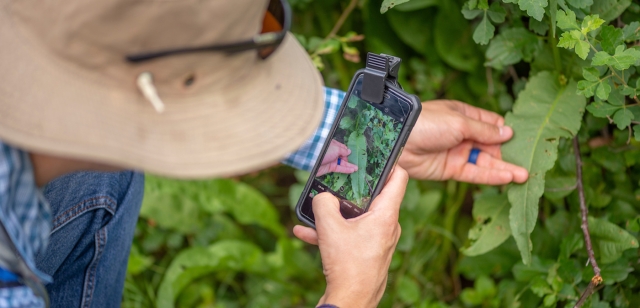EcoFlora Project
The Denver EcoFlora Project is a collaboration between Denver Botanic Gardens, New York Botanical Garden, and the Institute of Museum and Library Services to engage community scientists with biodiversity in the Denver – Boulder metro area.
Launched in 2020, the Denver EcoFlora Project has two main goals. First, to meaningfully engage the community in observing, protecting and preserving the metro area’s native plant species and second, to assemble novel observations and data on the metro area’s flora to better inform policy decisions concerning land management and conservation strategies.
Anyone can participate in the Denver EcoFlora Project – all you need is access to a smartphone and a few minutes to spend learning the community science application iNaturalist.
EcoFlora participants document biodiversity through iNaturalist. This application allows users to publish photos of a plant, animal, fungal or insect specimen with data on when and where it was observed. Using data previously published, iNaturalist will suggest an identification for the observation and other users will verify the identification or provide their own. Find iNaturalist trainings.
The EcoFlora Project consists of plant and fungal observations made within the Denver – Boulder metro area. Participants are driven to grow observations through monthly EcoQuests, which challenge participants to discover biodiversity in different areas (yard, park, national forest) or in different ways (species color, smell or relevance in current research).
- Learn more about EcoQuests and browse all current project observations by visiting the Denver EcoFlora Project on iNaturalist.
- You can also sign up to receive monthly Denver EcoFlora EcoQuest e-newsletter.
EcoQuests
We hope that you will participate in this community science effort!
Here is the February EcoQuest: Looking for Love(ly Lichens)
Here are previous EcoQuests.
Phenology
Phenology is the study of phenomena like flowers blooming in the spring or leaf color changes in the fall.
Scientists are interested in the timing of such biological events and their relationship to climate. In ecological research, understanding phenology is critical to timing seasonal work like plant population monitoring and seed collection, while agricultural scientists and farmers use it to plan everything from planting to pest management to crop harvest.
Since the 1950s, dedicated volunteers across the country have tracked the phenology of lilacs. Partnering with the USA National Phenology Network (USA-NPN), the Gardens monitors the phenology of many of the plants in the lilac garden. We also partner with Project BudBurst (PBB) to monitor 10 other easily recognizable species throughout the Gardens. These organizations support community science projects conducted by a network of people across the United States who monitor plants and report their data throughout the year. Partnering with US-NPN, we developed a Phenology Trail which currently includes three sites in Colorado.
Become a community scientist and help monitor plant phenology on one of the species the Gardens monitors or any one of the hundreds of species being monitored nationally by contributing your data to our partner organizations (National Phenology Network or Project Budburst).
Learn more about lilac monitoring at the Gardens in partnership with USA-NPN.
Learn more about the 10 Project BudBurst species we monitor at the Gardens.
Learn more about the development of our Phenology Trail throughout Colorado.
